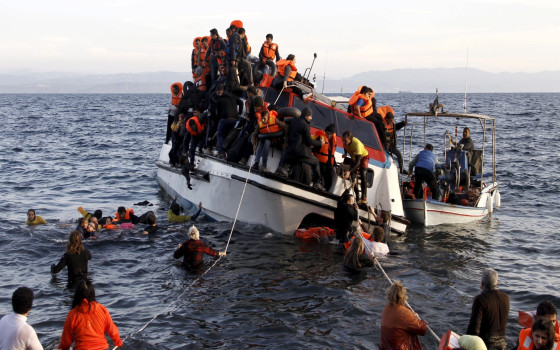
UNICEF: The world is 'deliberately ignoring' infant deaths in the Mediterranean

- Europe and Arabs
- Saturday , 15 July 2023 18:28 PM GMT
Geneva - Brussels: Europe and the Arabs
The United Nations Children's Fund (UNICEF) reported that the number of children who died while trying to cross the Mediterranean to reach Europe doubled in the first half of this year compared to the same period last year, and called on world leaders to "go beyond condolences and resolute pursuit of effective solutions." I love what came in the United Nations news bulletin, of which we received a copy this morning.
During a press conference in Geneva, on Friday, UNICEF's Migration and Displacement File Officer, Verina Knauss, said that the central Mediterranean is one of the most deadly migration routes in the world for children, who are still fleeing their homes due to conflicts and climate change.
"This year, 289 children died at sea - the equivalent of 11 children dying every week - far more than we hear in the headlines, and almost double the number of children who died at sea last year," she added.
Deadly silence
Ms. Knauss said that these figures are likely to be a significant underestimate because many boat sinkings on the central Mediterranean crossing leave no survivors and are not recorded, making it virtually impossible to verify the true number of child victims.
UNICEF estimates that 11,600 children made the journey during the first six months of this year, double the number for the same period in 2022.
The UNICEF official said the silence surrounding preventable deaths seemed to indicate that the world was deliberately ignoring what was happening.
She added, "Children are dying not only before our eyes; they are dying while we seem to close our eyes. Hundreds of girls and boys are drowning in the inaction of the world."
Rights beyond borders
UNICEF supports countries in strengthening national child protection, social protection, immigration and asylum systems to ensure the safety of children on the move.
It also works with countries to provide comprehensive support and services for all children, regardless of their legal status and that of their parents.
Ms. Knauss said that governments must protect children's rights and best interests in line with their obligations under national and international laws. "The rights under the Convention on the Rights of the Child do not stop at borders or beaches - they travel with children as they cross," she added. United Nations news that we received a copy of
rescue duty
The UNICEF official said there must be safe, legal and accessible pathways for children to seek protection and be reunited with family members. She stressed the importance of countries strengthening coordination in search and rescue operations and ensuring speedy descent to safe places.
“The duty to search for and rescue a boat in danger is a fundamental rule of international maritime law,” she said. “States and ships are obligated to provide assistance regardless of circumstances or intentions. Pushbacks at sea (or at land borders) are violations of national law, EU law and international law.” And she continued:
"Every day that goes by without agreement on how to share responsibility - fairly and effectively to prevent deaths at sea - is a day that more children are put in harm's way."
separated children
According to UNICEF, the number of unaccompanied or separated children tripled in the first three months of 2023 compared to the same period last year. These children represent 71 percent of all children arriving in Europe via the Central Mediterranean route.
The UN agency warned that girls who travel alone are particularly vulnerable to violence before, during and after their travels.
“These children need to know that they are not alone,” said Ms. Knauss. “World leaders must act urgently to demonstrate the undeniable value of children's lives.”












No Comments Found